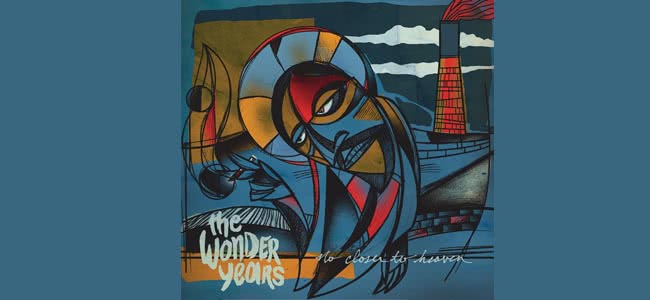After the critical and commercial success The Greatest Generation, which dominated many end-of-year lists, Dan ‘Soupy’ Campbell referred to it as the final piece in a trilogy of albums about his growing up as well as signifying the end of the war he had struggling with his anxiety and depression. Two years removed, and The Wonder Years were overdue for a new record, and with Soupy having exhausted his lyrical focus, he suffered from a severe case of writer’s block, leading him to take influence from what was around him.
No Closer To Heaven opens with the one-two punch of ‘Brothers & Cardinals’, (the former of which acting as an introduction before segueing into the latter) the Pennsylvania sextet perfectly capturing the looming feeling of depression, all while simultaneously powering through it. The result leaves the record with a unique sense of hope and naivety that is further accentuated by the electricity and energy put forth by each member.
The chorus work of lead-single ‘Cardinals’ plays off the start/stop guitar as well as backing vocals by guitarists Matt Brash, Casey Cavaliere and Nick Steinborn chanting; “We’re no saviours if we can’t save our brothers”, which bookends the introduction gorgeously. Seamlessly transitioning between light and heavy as Soupy’s voice tears through the chorus, pleading with the listener.
“I swear I’ll never let you down again.”
What makes No Closer To Heaven so special is that Soupy’s lyricism, although personal, are planted so firmly in reality that it becomes so eerily relatable without ever crossing into unbelievable or sanctimonious territories. “My airbag light’s been on for weeks, and I can feel it mock me” laments Soupy during ‘A Song For Patsy Cline’ as the rest of his entourage assist in a set of faint “woah-ohh’s”. Moreover, ‘Cigarettes & Saints’ is a touching, slow reprieve that carefully ascends to a deep, darkly anthem that is led by Soupy’s sombre vocals.
Despite having a more than capable voice to match the quality of his lyrics, and even as he cleaves through those chorus highs with gusto, it’s hard not to feel like Soupy’s holding himself back at some points, perhaps even stylistically so. The Greatest Generation showcased a more intrusive and proactive set of vocals, especially on the likes of ‘Dismantling Summer’ and yet the whole process here seems slightly too cautious.
Luckily, Letlive frontman Jason Aalon Butler throws his voice in for a verse on ‘Stained Glass Ceilings’, giving the track a much needed sense of urgency, which contrasts nicely with Soupy’s, desperate, yearning wail as Mike Kennedy bashes away at his kit. The penultimate ‘Palm Reader’ stands tall as one of the album’s best tracks as wailing guitar bridges coupled together with Soupy’s vocals makes for one of the most memorable and simultaneously touching choruses in recent memory.
“I’m gonna stand up straight. I’m gonna clear my throat and speak out unafraid. Mom, I want you to know; I’m letting everything you taught me guide me home.”
The record ends on a somewhat bittersweet note, as Soupy’s voice murmurs over the top of a momentary acoustic number as he declares, “We never reach the gates, I’ll keep walking anyway. I’m no closer to heaven”, sustaining the idea that the notion of prospective happiness is unobtainable and instead to be content with day-to-day life, because that’s the life we’re really living.
Despite being a bit weightier in sound than its predecessor, The Wonder Years have succeeded in creating another fantastic addition to their discography and further cement the fact that a once thought outdated genre of pop punk can effectively straddle the line between catchy hooks and mature songwriting. No Closer To Heaven is an album that reeks of optimism, yet does so without ever coming across as saccharine. Not only is it musically and lyrically genuine – but also life affirming and delightfully sincere.

































